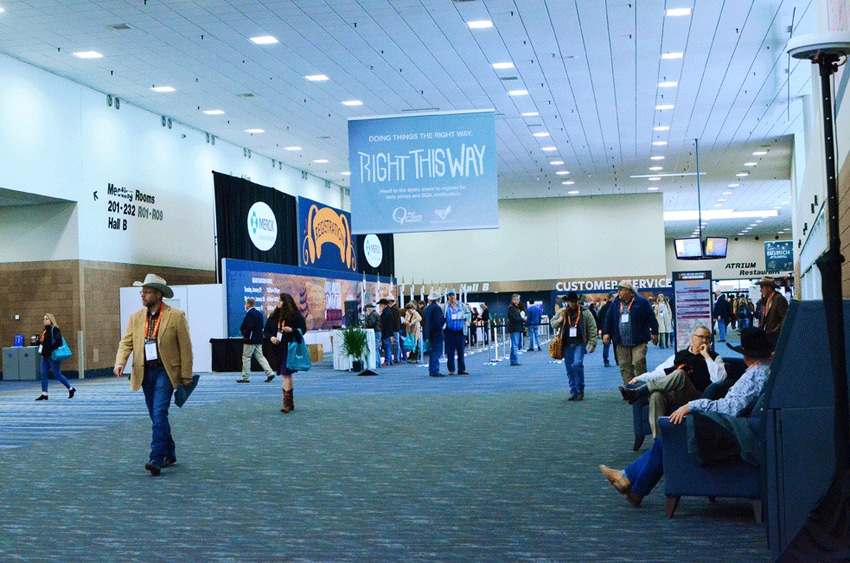Curiosity and the life-long learner: Burke shares insight from Cattle Industry Convention
After lots of visiting and listening during this year’s Cattle Industry Convention, Burke Teichert takes time to do a little pondering.
February 6, 2019

I am writing this almost immediately after returning from the 2019 Cattle Industry Convention in New Orleans. After attending Cattlemen’s College and visiting with a number of smart people, I took some time to “wonder†a little about things I heard, saw and discussed.
I wonder how many ranchers in the U.S. with herds smaller than 500 head could afford to attend the convention without assistance from a day job or a state cattlemen’s affiliate that sent them as a committee member or in some other capacity.
I wonder how the salaries of the allied industry folks compare with the salaries of some of our best ranch employees. Could that explain why so many of our kids end up selling us services or stuff rather than returning to the ranch? Or do they find spouses who don’t want to live in the country or adopt the ranching lifestyle? Both?
I wonder why so many livestock handlers don’t get really good at working cattle. Could it be that they see that they do a few things like the experts (we saw a few demonstrate working cattle at the convention) and then assume that they have it all figured out?
Bud Williams, the truly great one, once told me that I could probably find several things that I did very similarly to the way he did; and then I would assume that I was as good as he. He then said, “And you are not.†He suggested that I should look for things he did differently than I, make sure that I understood what he was doing and then ask why he did it that way—great advice for any life-long learner.
So, I wonder what the result might be If every livestock handler, grazier, cattle breeder, etc. would look at a new opportunity to learn in this way—trying to see what a good grazier or good cattle breeder does differently, then make sure you understand what they are doing and why they do it.
You might do the same with someone who has replaced a lot of fed feed with grazed feed. The best learning experiences of my life have come after being led to someone who is truly good at something and then watching and learning.
I wonder why so few have embraced the concepts of soil health and good grazing. Many ranchers have really had great results in improving soil health, plant diversity and vigor, moisture infiltration and soil moisture holding capacity along with improvements in profitability. But, the percentage of ranchers doing it is pitifully small—even now that there are many good examples from which to learn.
I wonder what the public perception of grazing animals would be if all ranchers would graze like the best graziers and if the agency range conservationists had the mindset to learn the methods and allow ranchers to use them. (Some do.)
Would the public recognize and enjoy the reduction in erosion, the improvement in water quality, the obvious improvement in the appearance of the landscape, the increase in pollinators and bio-diversity, etc.?
I wonder how much ranch profitability would improve if ranchers would make a good choice between being terminal breeders or maternal breeders—a choice that would consider their size, resources, location and abilities and then if they would choose bulls to fit.
The terminal breeders would select for calving ease direct, high growth and carcass traits. The maternal breeders would select first for fertility, then for moderation in growth and milk, and finally for functionality—calving ease, docility, hardiness, good udders.
Another Take from Burke: Burke stopped by the BEEF booth at the Cattle Industry Convention and chatted with Senior Editor Burt Rutherford about sustainability and soil. Watch their chat here.
I wonder what we would learn if all research was published and if sources of funding were always revealed. I say that because I know of unpublished research that left doubt about previous findings.
I further wonder how quality of research might change if “publish or perish†and tenure were abolished. What if there were rewards for long-term systems research? Most of agriculture reacts slowly to changes of method and inputs; and, therefore takes time (most often years) to come to meaningful conclusions.
I am sure that my wondering has seemed critical; and I intended it to be so. However, I have to include myself among those criticized.
I am not young anymore; and I can assure you that I, for too long, did several of the things of which I am now critical of. My challenge is for all of us to become better and more engaged life-long learners—to become better systems thinkers and observers. We should also recognize that perfection will never be achieved, but excellence can be reached by many.
About the Author(s)
You May Also Like



